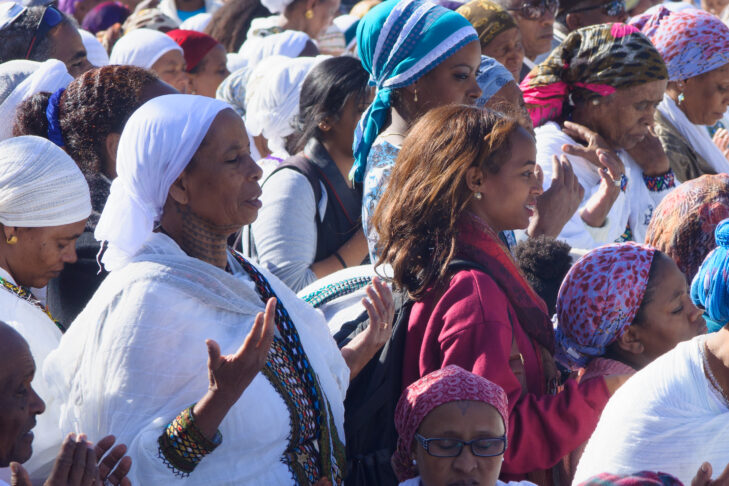Yarden Fanta was 12 years old when she left Ethiopia. Her parents, nine siblings and grandmother walked barefoot to a Sudanese refugee camp for over a month. Along the way, Fanta recalls her family carried white flour, salt and water. Many people died on that perilous journey, including one of her sisters. After spending 11 months in the camp, she and her family were airlifted to Israel. In Israel, “I was born again,” she recently told JewishBoston.
Fanta came to Israel as a young illiterate girl who had tended her family’s sheep on their farm in Ethiopia. Within a decade, she was the first Ethiopian Jewish woman to earn a Ph.D. in Israel. It feels especially significant to share her accomplishment on the eve of Sigd—an Ethiopian Jewish holiday. Celebrated 50 days after Yom Kippur—on the 29th day of the Hebrew month Cheshvan—Ethiopian tradition designates Sigd as the day Moses initially glimpsed God.

The word “Sigd” means “worship,” and with its echoes of Shavuot, embraces the covenant between God and the Jewish people. Like Yom Kippur, the holiday is a fast day. People dress in white and ascend a mountain peak representing Mount Sinai. Along the way, the community elders bring the Ethiopian Torah, called Orit and written in Ge’ez—an ancient Ethiopian Semitic language. The word Orit is believed to have roots in the Hebrew word for light, ora.
Sigd’s origins are thought to date back to the 6th century, when the Jewish-Christian War ended. However, the earliest written acknowledgment of Sigd occurred in the 15th century. At the time, Christian emperors were persecuting Jews and forcing them to convert. The timing has led scholars to believe that Sigd evolved to celebrate the unbreakable bond between the Jewish people and God.
In 2008, the Israeli government recognized Sigd as an official holiday. More than 135,000 Ethiopian Jews live in Israel today. Over 22,000 of them were airlifted in Operation Moses in 1984 and Operation Solomon in 1991. More than three decades later, the Ethiopian Jewish community still lags behind its fellow Israeli citizens socioeconomically. Educationally, the numbers reflect a more hopeful situation, with over 90% of Ethiopian Israelis having earned a high school diploma.
The first time Fanta walked into a classroom, she was 14 and did not know how to read and write in any language. She went on to thrive in Israel’s schools. “Holding a pencil, you write your name, you write some letters and go from there,” she said. She brought similar patience, optimism and drive that propelled her to walk hundreds of miles toward Jerusalem to her studies.
Once in Israel, the family frequently moved from one absorption center to another. They finally settled in Netanya, and Fanta, who had been identified as a gifted student, won a scholarship to a boarding school in Holon. But as successful as she was academically, Fanta didn’t see a college education in her future. “Going to university was like touching the sky that belonged to other people,” she said. “I couldn’t see myself going to university.”
The dream of going to college became a reality when she attended a science program for high school students on a university campus. After participating in that program, she knew she would find a way to cultivate hope and educational aspirations in her fellow Ethiopian Israelis.
Fanta went on to earn her bachelor’s degree in sociology from Bar-Ilan University and a master’s degree and doctorate from Tel Aviv University in education. She came to Boston for a post-doctoral fellowship at Harvard University’s Graduate School of Education. Attending Harvard was another first for a woman from Israel’s Ethiopian Jewish community. Fanta stayed in the Boston area, settling in Newton, where she continues her activism on behalf of Ethiopian Jews and, as she describes it, helps people “to fulfill their true potential through coaching, training and public speaking programs.” She added: “Everybody can take on a role of changing someone’s life. I am grateful for Israel and the Jewish communities around the world.”
Among the ways she has given back to her community was through a program she founded for 13- to 15-year-old Ethiopian Israelis called “Thinking Science.” The idea originated with a month-long science and peace expedition Fanta took to Antarctica. She and three other Israelis, along with four Palestinians, went there “to break the ice.” The trip was endorsed by Kofi Annan, then-secretary-general of the United Nations, the Dalai Lama, Yasser Arafat and Shimon Peres.
“The trip was another extreme in my life, like walking across Sudan,” Fanta recalled. “In Sudan, we lived on hope and prayer. In Antarctica, we were safe and had the tools to effectively talk to each other.” She noted that in Antarctica, there was not an option to leave the table. “We had no choice but to talk and listen to each other. We had long histories and big stories to share with each other.”
One formative experience from that time was climbing a mountain with her fellow participants. “We were literally roped together and had to help each other,” she said. “It was an unbelievable message and a group effort.” When the party of eight reached the peak, they named the mountain “The Israeli-Palestinian Friendship Mountain.”
The gesture of peace on a distant continent echoes some of Sigd’s traditions. Ascending a mountain plays a significant role for Ethiopian Jews to approach God symbolically. A year after she returned from Antarctica, Fanta earned her Ph.D., and “Thinking Science” was up and running with help from the Ministry of Immigrant Absorption and Tel Aviv University.
According to Fanta, the program began modestly with 40 students paired with students from Tel Aviv University to explore science in campus laboratories. Today, “Thinking Science” has grown to support over 300 students. “We bring curiosity, hope and even sparkle to students,” said Fanta. What could be more celebratory than that on the eve of Sigd?



